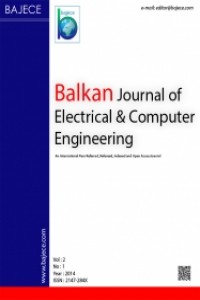Abstract
— Different algorithms for Hurst exponent estimation, namely aggregated variance, absolute moment, Higuchi and Peng method, are applied to eight different vibration signals obtained in induction motor aging process. Signals were obtained with accelerometers during an artificial fluting, thermal and chemical aging process. Applicability of Hurst exponent analysis for motor age detection is discussed based on estimation results. Drop of the exponent value for degraded states with respect to the original state is detected, while no monotonic relationship between subsequent states is found. The anti-persistent nature of vibrations is confirmed
References
- J.Beran, Statistics for Long-Memory Processes. Chapman & Hall, New York, 1994.
- K. Q.Dong, P. J. Shang, and H.Zhang, “The Multi-Dependent Hurst Exponent in Traffic Time Series”, Applied Mechanics and Materials, vol. 20-23, 2010, pp.346-351.
- A. S. Erbay, Multi Sensor Fusion for Induction Motor Aging Analysis and Fault Diagnosis, Ph.D. dissertation, The University of Tennessee, Knoxville, 1999.
- H.E.Hurst, Long-term storage of reservoirs: an experimental study. Transactions of the American Society of Civil Engineers, vol.116, 1951, pp.770-799.
- Hurst parameter estimate (by Chu Chen) (2008), Last Accessed on Feb 28, 2013. Hyperlink: http://www.mathworks.com/matlabcentral/fileexchange/19148-hurst- parameter-estimate,
- S.Ikizoglu, R.Caglar, and S.Seker, “Hurst Parameter and Fractal Dimension Concept for Fault Detection in Electric Motors”, Int. Rev. of Electrical Eng. Part A, Vol.5, No.3, 2010, pp. 980-984.
- J.Lin, Q. Chen, X. Tian, and F.Gu, “Fault Diagnosis of Rolling Bearings using Multifractal Detrended Fluctuation Analysis and Mahalanobis Distance Criterion”, Proc. of the 18th International Conference on Automation and Computing (ICAC), 2012, Loughborough, UK.
- B.Qian, and K.Rasheed, “Hurst Exponent and financial market predictability”, IASTED conference on Financial Engineering and Applications, FEA 2004, pp.203-209
- S.Rehman, “Study of Saudi Arabian climatic conditions using Hurst exponent and climatic predictability index”, Chaos, Solitons & Fractals vol.39, no.2, 2009, pp. 499-509.
- M. S. Taqqu, V. Teverovsky, and W.Willinger, “Estimators for Long- Range Dependence: An Empirical Study”, Fractals, vol.3, 1995, pp. 785-7 BIOGRAPHY
- Harun ŠILJAK (BoEE 2010, MoEE 2012 at University of Sarajevo) is currently a PhD student at the International Burch University Sarajevo. Beside his interest in vibration signal processing, his research interests processes, mobile robotics and control theory. functions, random
- Serhat ŞEKER, was born in Istanbul, Turkey. He
Abstract
References
- J.Beran, Statistics for Long-Memory Processes. Chapman & Hall, New York, 1994.
- K. Q.Dong, P. J. Shang, and H.Zhang, “The Multi-Dependent Hurst Exponent in Traffic Time Series”, Applied Mechanics and Materials, vol. 20-23, 2010, pp.346-351.
- A. S. Erbay, Multi Sensor Fusion for Induction Motor Aging Analysis and Fault Diagnosis, Ph.D. dissertation, The University of Tennessee, Knoxville, 1999.
- H.E.Hurst, Long-term storage of reservoirs: an experimental study. Transactions of the American Society of Civil Engineers, vol.116, 1951, pp.770-799.
- Hurst parameter estimate (by Chu Chen) (2008), Last Accessed on Feb 28, 2013. Hyperlink: http://www.mathworks.com/matlabcentral/fileexchange/19148-hurst- parameter-estimate,
- S.Ikizoglu, R.Caglar, and S.Seker, “Hurst Parameter and Fractal Dimension Concept for Fault Detection in Electric Motors”, Int. Rev. of Electrical Eng. Part A, Vol.5, No.3, 2010, pp. 980-984.
- J.Lin, Q. Chen, X. Tian, and F.Gu, “Fault Diagnosis of Rolling Bearings using Multifractal Detrended Fluctuation Analysis and Mahalanobis Distance Criterion”, Proc. of the 18th International Conference on Automation and Computing (ICAC), 2012, Loughborough, UK.
- B.Qian, and K.Rasheed, “Hurst Exponent and financial market predictability”, IASTED conference on Financial Engineering and Applications, FEA 2004, pp.203-209
- S.Rehman, “Study of Saudi Arabian climatic conditions using Hurst exponent and climatic predictability index”, Chaos, Solitons & Fractals vol.39, no.2, 2009, pp. 499-509.
- M. S. Taqqu, V. Teverovsky, and W.Willinger, “Estimators for Long- Range Dependence: An Empirical Study”, Fractals, vol.3, 1995, pp. 785-7 BIOGRAPHY
- Harun ŠILJAK (BoEE 2010, MoEE 2012 at University of Sarajevo) is currently a PhD student at the International Burch University Sarajevo. Beside his interest in vibration signal processing, his research interests processes, mobile robotics and control theory. functions, random
- Serhat ŞEKER, was born in Istanbul, Turkey. He
Details
| Primary Language | English |
|---|---|
| Journal Section | Reviews |
| Authors | |
| Publication Date | March 1, 2014 |
| Published in Issue | Year 2014 Volume: 2 Issue: 1 |
All articles published by BAJECE are licensed under the Creative Commons Attribution 4.0 International License. This permits anyone to copy, redistribute, remix, transmit and adapt the work provided the original work and source is appropriately cited.


